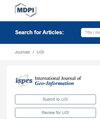绘制国家公路网的地理空间人工智能洪水风险图
IF 2.8
3区 地球科学
Q2 COMPUTER SCIENCE, INFORMATION SYSTEMS
引用次数: 0
摘要
以往的研究利用机器学习算法,结合地形和地质特征对洪水易发性进行建模,从而绘制出全面的洪水地图。本研究创新性地将地理空间人工智能整合到危害测绘中,以评估葡萄牙各市道路网络的洪水风险。此外,它还结合 OpenStreetMap 的道路网络数据来研究脆弱性,并提供描述性统计解释。通过空间叠加技术,可根据路段与已识别危险区的距离对其洪水风险进行评估。这种方法有助于详细绘制受洪水影响的道路网络图,为基础设施规划、应急准备和减灾战略提供重要见解。这项研究强调了将地理空间分析工具与开放数据相结合以提高关键基础设施抵御自然灾害能力的重要性。所绘制的地图有助于了解洪水对交通基础设施的影响,并帮助决策者、保险业和道路基础设施资产管理者做出明智的决策。本文章由计算机程序翻译,如有差异,请以英文原文为准。
Mapping Geospatial AI Flood Risk in National Road Networks
Previous studies have utilized machine learning algorithms that incorporate topographic and geological characteristics to model flood susceptibility, resulting in comprehensive flood maps. This study introduces an innovative integration of geospatial artificial intelligence for hazard mapping to assess flood risks on road networks within Portuguese municipalities. Additionally, it incorporates OpenStreetMap’s road network data to study vulnerability, offering a descriptive statistical interpretation. Through spatial overlay techniques, road segments are evaluated for flood risk based on their proximity to identified hazard zones. This method facilitates the detailed mapping of flood-impacted road networks, providing essential insights for infrastructure planning, emergency preparedness, and mitigation strategies. The study emphasizes the importance of integrating geospatial analysis tools with open data to enhance the resilience of critical infrastructure against natural hazards. The resulting maps are instrumental for understanding the impact of floods on transportation infrastructures and aiding informed decision-making for policymakers, the insurance industry, and road infrastructure asset managers.
求助全文
通过发布文献求助,成功后即可免费获取论文全文。
去求助
来源期刊

ISPRS International Journal of Geo-Information
GEOGRAPHY, PHYSICALREMOTE SENSING&nb-REMOTE SENSING
CiteScore
6.90
自引率
11.80%
发文量
520
审稿时长
19.87 days
期刊介绍:
ISPRS International Journal of Geo-Information (ISSN 2220-9964) provides an advanced forum for the science and technology of geographic information. ISPRS International Journal of Geo-Information publishes regular research papers, reviews and communications. Our aim is to encourage scientists to publish their experimental and theoretical results in as much detail as possible. There is no restriction on the length of the papers. The full experimental details must be provided so that the results can be reproduced.
The 2018 IJGI Outstanding Reviewer Award has been launched! This award acknowledge those who have generously dedicated their time to review manuscripts submitted to IJGI. See full details at http://www.mdpi.com/journal/ijgi/awards.
 求助内容:
求助内容: 应助结果提醒方式:
应助结果提醒方式:


